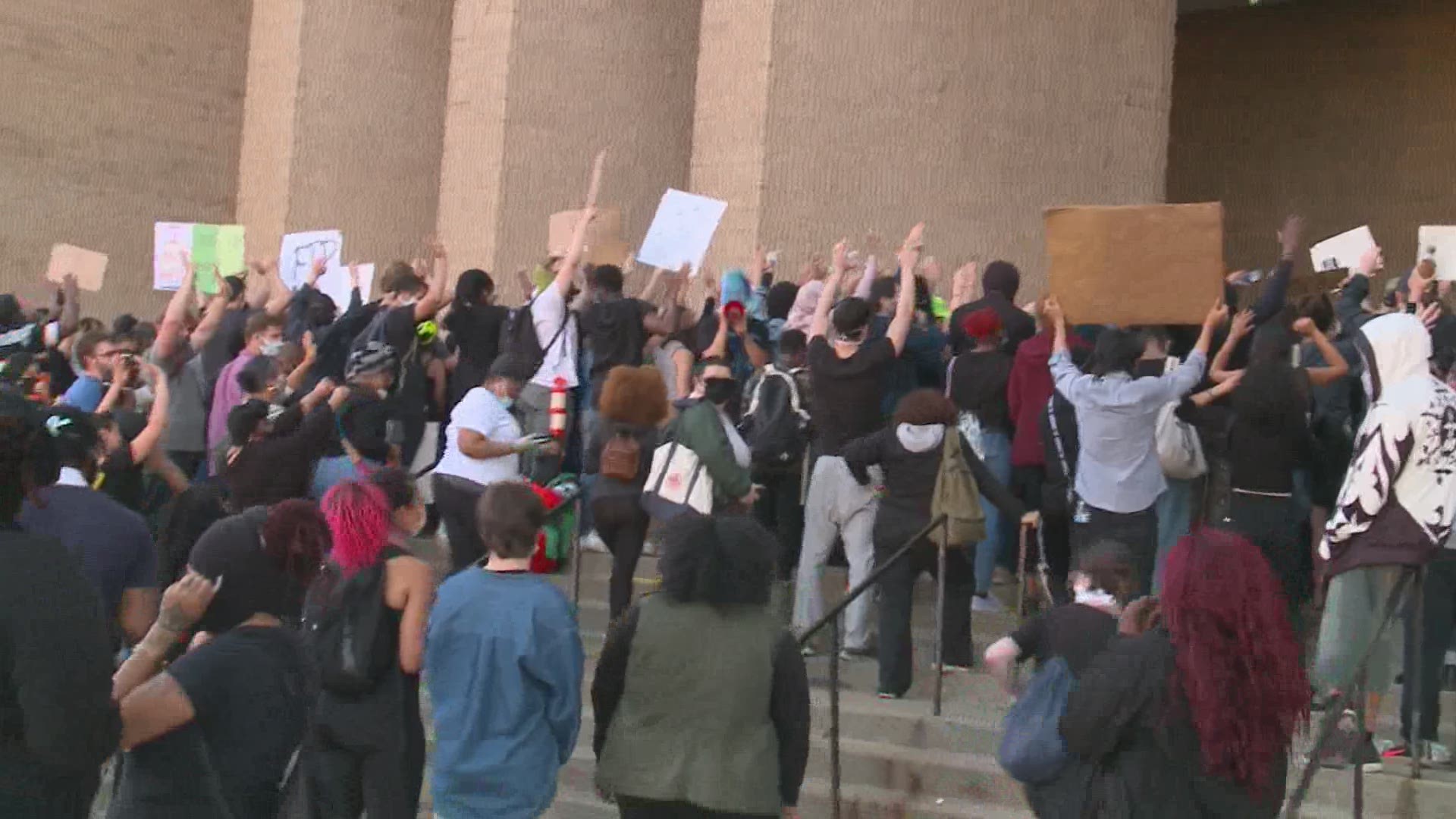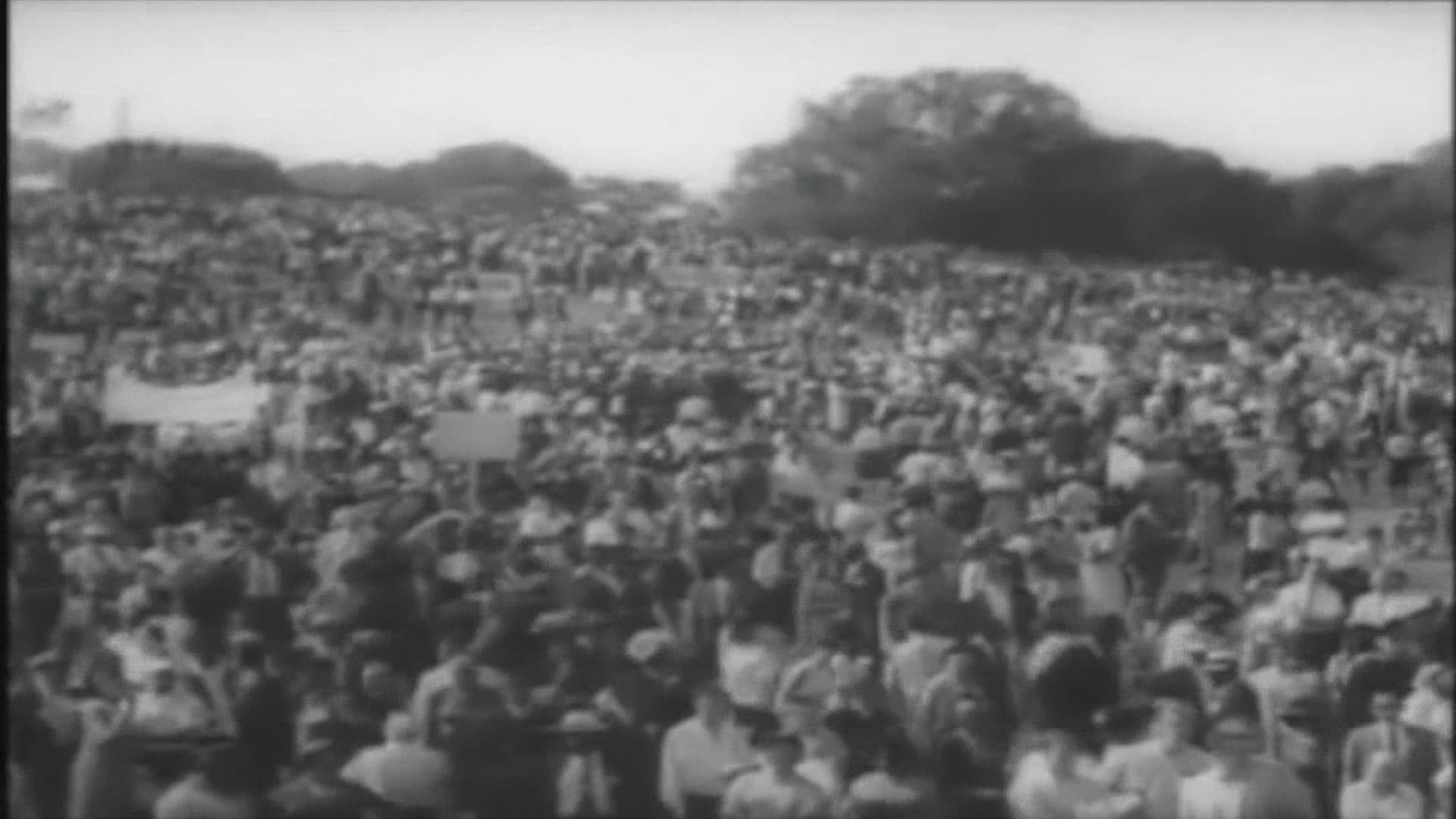HARTFORD, Conn — In the state of Connecticut we’ve seen protests in Bridgeport, New Haven, Newington, Fairfield, Hamden, Hartford and so many more.
Trooper First Class Christine Jeltema during a Hartford protest said, “These protestors just want to be heard, and they have every right it’s their first amendment right and we want to make sure they are doing that safely."
While mainly the protests in Connecticut have had peaceful endings, week after week they persist and continue to remain strong.
Kerry Ellington, who is a well-known activist said, “We’re protesting here in Connecticut here in Connecticut because there is a crisis of police brutality and violence in black and brown communities across our state in both rural, suburban and urban areas and while we want to stand in solidarity with the movement growing across the country resisting police violence and calling for justice for countless victims we want to bring attention right here in our state to the critical problem of police violence and push to bring resolve to this crisis in our community.
Over recent years young Black and brown people have joined the names of those who have died during encounters with police.
Names like Mubarak Soulemane, a young man who was shot and killed by a state trooper in West Haven at the end of a high-speed chase’
Jayson Negron, a 15-year-old shot and killed after police say he was behind the wheel of a car reported stolen in Bridgeport. The officer cleared by the state’s attorney of wrongdoing.
RELATED: Black in America | How do we move forward after the death of George Floyd? First we must look back.
Anthony Vega Cruz, the 18-year-old shot by a Black Wethersfield officer during an attempted traffic stop.
That officer also cleared but has since resigned.
According to the Hartford Courant, in the past 5 years, 21-people have died at the hands of police in Connecticut—each with their different ruling; but one thing is constant.
There has been no case in which an officer has been criminally charged for the death of a person in the state.
Activists like Kerry Ellington say dealing with death each time chips away at her soul.
Kerry Ellington said, “It weighs on my heart that I know mothers right here in Hartford, I know mothers right across the state that most in recent years have lost their sons, have lost their loved ones due to police violence, so it weighs on me to have to carry that every day and because I know how much I don’t understand the incredible the enormous amount it must weigh on them to have to get up every day when you don’t have your child with you.”
It’s the reason why Maurice Porter, a pastor and founder of Impact Church, says even he has had to have serious talks with his own young child.
“I have a son whose 9-years old. I’ve explained to him that he is a marked man because of the color of his skin, not because of the content of his character... I want him to understand that," said Pastor Porter. "(I) want him to understand why we don’t do certain things and I think that is important for us to understand that it is a shame that fathers have to appeal to their sons and instead of playing catch with them, you know teach them their basics. Educationally I think it’s important for us to see that most fathers are teaching their sons how to respond if they are pulled over by the cops or how to act when their skin is brown, so I think we should be honest with our children because if not we could place our children in danger.”
RELATED: Black in America | How do we move forward after the death of George Floyd? First we must look back.
Porter moved to the Connecticut-area years ago and says what Black people deal with here is no different than that in the south
“What we think we may have gotten over in southern states is not true it’s more of a façade, many people believe because they are not in the rural south, if you will, that we have overcome and it’s not at all true. Black and brown people across the country, do not have the benefits of the Blacks and brown people right here in Connecticut so it’s important to understand we that within the minority we are a minority,” said Porter.
This is a statement that speaks to those who have more affluence.
Connecticut one of the top five richest states in the nation, but also has deep disparities.
State Representative Brandon McGee says while George Floyd’s death sparked a conversation about police brutality the fallout has also brought other racial issues to the forefront from redlining to medical mistreatment, to educational disparities.
“So in Connecticut specifically education has been on the deciding factors for a young person of color in whether or not they are going to be successful and not having access to quality education has been I think the stain in Connecticut’s history," said McGee. "Sure, we’ve had all types of initiatives Sheff V. O’Niell- integration of schools, love it. But now we have this challenge of whether your kid should go to a charter school or a magnet school. What happened to the discussion of just having access to quality education regardless of the model and so when you began to talk about the challenges the northeast, Connecticut, in particular, I would say definitely the disparities between the haves and the have not.”
You can look no further than social media, where many people comment-after-comment have shared negative rhetoric about Connecticut protests and denying racial issues in the state.
Senator Douglas McCrory said, “I say that’s a cop-out, an inconvenient cop-out, you know, we know that All Lives Matter, the problem is that the black lives don’t matter. I’ll use this as an example: I was in an audience, majority-white folks, and I say raise your hand if you would like to be treated the way black people are treated in this country… not one hand went up. You know what that tells me, that White America knows what’s going on and we’re at a point now that we have an opportunity to change that.”
But in recent reports, just in the month of June, that’s not the case.
Many people of color say this is what drives them as activists and people continue to protest to fight against the very thing that they say keeps black and brown people down through systemic racism.
Jazmarie Melendez who is an organizer of Justice for Jayson said, “I don’t want anyone to go through what I went through, I don’t want anyone to feel the pain of losing their brother, losing their sister, or losing someone they love at the hands of police.”
Mikeala Adams echoed Melendez and said, “We’re going to be out here as long as it takes we are not going anywhere because with the change comes in inconvenience and it’s not going to be something that’s going to be easy for us, and you know it’s time but as long as it takes so our children don’t have to see the same things we faced.”
But one question remains, what’s next?
“In order for us to heal form this moment… let me rephrase it, we cannot heal unless we acknowledge and address what we are contending with and that is a system that constantly - and if I can use Al Sharpton’s words, ‘putting a knee to a throat’," McGee said. "So in order for us to heal, we have to look through a historical context of where we are, where we have come from and immediately address some of these lack of accountabilities that police departments take advantage of and we got to change some law like quick so that people can feel okay we’re moving toward some sort of resolve on this. Is racism going to be erased tomorrow, no probably not, but there are some accountability measures and policies that we ought to put in place to help ensure that what happened a few weeks ago to George Floyd doesn’t happen again.”
Thursday on FOX61 News, we are hoping to provide real solutions by having real conversations or at the very least an understanding on how we can move forward together.


